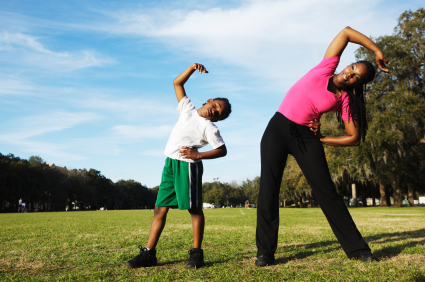Your child may think that warming up is just part of his team's routine, but a good warm up before workouts, practice and games is vital to achieving optimum performance and preventing injury.
Important in cooler weather
 As the weather gets cooler, a good warm up is even more vital. Over the course of my cycling career I was guilty, on occasion, of getting warmed up and then sitting down on the bench, all sweaty and damp, for far too long before I actually started my workout or race. While probably still better than starting from scratch, allowing your child to get cool again between his warm up and game may decrease his performance and increase his risk of injury.
As the weather gets cooler, a good warm up is even more vital. Over the course of my cycling career I was guilty, on occasion, of getting warmed up and then sitting down on the bench, all sweaty and damp, for far too long before I actually started my workout or race. While probably still better than starting from scratch, allowing your child to get cool again between his warm up and game may decrease his performance and increase his risk of injury.
Make time
In cold weather, your child's muscles are - well - colder, and therefore he'll require a longer warm up with a more gradual increase in intensity. Once he is feeling warmed up, he may also consider including additional high-intensity activities to his routine to ensure his muscles are ready to go.
Stay warm
We all know how quickly food cools down once it's been taken out of the oven. By the time everyone washes their hands, gets to the table and says a blessing, often the food is no longer hot. Your child's muscles are the same way; he may find it hard to stay warm when he isn't actively participating in the workout or game.
- In cool weather he should wear extra warm clothing when he isn't actively participating and continue periodic exercises to keep his muscles warm.
- Staying warm is just as important as warming up the first time.
Injury prevention
There were a few times during my cycling career when due to my poor planning and organization, I jumped into a race or intense workout without a proper warm up, or in some cases any warm up. Each time my body revolted. Asking my unprepared muscles to suddenly fire at such intensity made me miserable; I felt stiff, sluggish, sore and unresponsive. More pressing than my discomfort was that I was putting myself at a much higher risk of injury, because cold muscles are more prone to injury.
A hard lesson
I was fortunate to never experience an injury due to an improper warm up, but I did experience another unfortunate consequence. I was participating in a very long cycling road race in lousy weather. My team and I decided not to warm up much, figuring we'd stay warm and dry in the car and could use the first several miles of the race to warm up. Long road races often start off relatively slow, so this was a reasonable assumption. However, it was not the case on that day. Another racer attacked off the front of the group from the start and the rest of the cyclists pursued at a blistering pace.
To make matters worse, we hadn't taken into account that, just past the start line, was a rather challenging hill. As we charged up the hill my body protested; I was unprepared to go fast, let alone fast uphill. My teammates and I hung on to the main group, but none of us recovered in time to make it into the small group of women that broke away off the front of the group and pulled away to win the race.
No ideal warm up
Everyone's ideal warm up is a little different, but the concept is the same. A warm up is an easy exercise, like walking, jogging or jumping jacks, which increases blood flow to your muscles and slowly elevates your heart rate.
I personally found that I needed less of a warm up than some of my teammates. If I warmed up too much, then I used up too much energy and felt tired before my race. I had always warmed up, but when I first moved to the Olympic Training Center they helped me develop my own warm up program. With their guidance I started using heart rate, and eventually wattage output, as a guide. Fundamentally there wasn't anything wrong with the warm up I had been doing before, but using these tools allowed me to implement a more precise and structured warm up.
Don't wing It
Have your child write down exactly which exercises he needs to do and for how long in order to achieve his optimal warm-up.
Developing a written plan will help him figure out how early he needs to begin his warm up before his practice or game. Even if your child's team warms up as a group, he may find he needs additional time, or that he needs to tone his workout down. Your child should talk to his coach if he feels he needs to diverge from his team's routine in order to be appropriately warmed up.
Help your child develop good warm up habits at a young age and set a good example by warming up yourself.
Erin Mirabella is a two-time Olympic track cyclist and mother and MomsTeam's track cycling expert.
Created October 13, 2010








